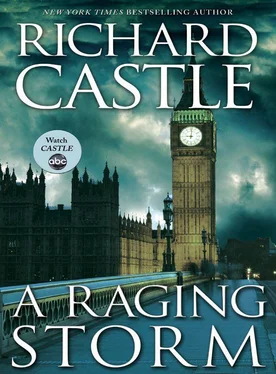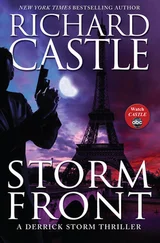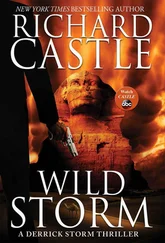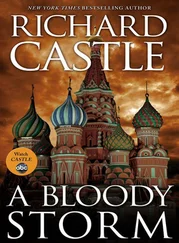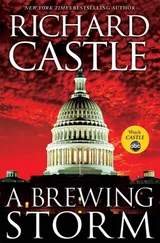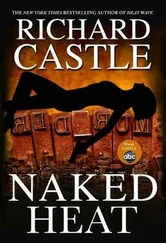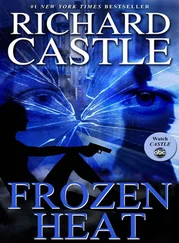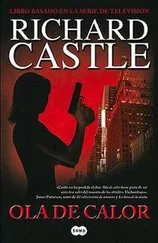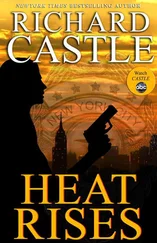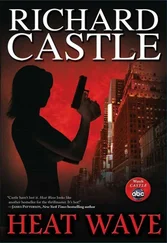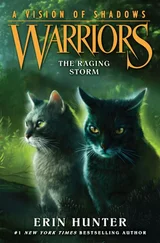Richard Castle - A Raging Storm
Здесь есть возможность читать онлайн «Richard Castle - A Raging Storm» весь текст электронной книги совершенно бесплатно (целиком полную версию без сокращений). В некоторых случаях можно слушать аудио, скачать через торрент в формате fb2 и присутствует краткое содержание. Год выпуска: 2012, Издательство: Hyperion, Жанр: Криминальный детектив, на английском языке. Описание произведения, (предисловие) а так же отзывы посетителей доступны на портале библиотеки ЛибКат.
- Название:A Raging Storm
- Автор:
- Издательство:Hyperion
- Жанр:
- Год:2012
- ISBN:нет данных
- Рейтинг книги:5 / 5. Голосов: 1
-
Избранное:Добавить в избранное
- Отзывы:
-
Ваша оценка:
- 100
- 1
- 2
- 3
- 4
- 5
A Raging Storm: краткое содержание, описание и аннотация
Предлагаем к чтению аннотацию, описание, краткое содержание или предисловие (зависит от того, что написал сам автор книги «A Raging Storm»). Если вы не нашли необходимую информацию о книге — напишите в комментариях, мы постараемся отыскать её.
A Raging Storm — читать онлайн бесплатно полную книгу (весь текст) целиком
Ниже представлен текст книги, разбитый по страницам. Система сохранения места последней прочитанной страницы, позволяет с удобством читать онлайн бесплатно книгу «A Raging Storm», без необходимости каждый раз заново искать на чём Вы остановились. Поставьте закладку, и сможете в любой момент перейти на страницу, на которой закончили чтение.
Интервал:
Закладка:
"Barkovsky!” a dark-haired beauty near the podium screamed. Her cry sparked a chorus. “Barkovsky! Barkovsky! Barkovsky!” It swept through the chamber like a wave. Glancing down from the stage at the woman, Barkovsky brought his fingers to his lips and blew her a kiss.
She fainted. He was a political rock star.
The late night rally was being held not in the ballroom of one of the new, dazzling Western-style hotels that now dotted the Moscow skyline, but in Mayakovskaya Metro Station on the Zamoskvoretskaya rail line. To the unaware, it may have seemed an odd choice. But to this crowd, it was a brilliant selection.
Joseph Stalin promised in 1932, when construction of the Moscow underground began, that the city’s railway stops would be artistic showplaces — daily reminders to the masses of the superiority of the Communist system. The Mayakovskaya station was a jewel in the Metro crown. It was such an engineering feat when it opened in 1938 that it was awarded a Grand Prize at the New York World’s Fair. It was designed to calm even the most claustrophobic traveler. Buried more than one hundred feet underneath the city, the station’s ceiling contained thirty-five individual, round niches with filament lights hidden behind them. The lights burned so brilliantly that it looked as if the summer sunshine were streaming through the panes. The station’s steel support beams were covered with pink rhodonite. Its walls were decorated with four different shades of granite and marble. Artists had created thirty-four mosaics in the ceiling, each glorifying the Soviet Empire. During World War II, the station had served as an air raid shelter and had escaped unscathed. But it was another historic event that had caused Barkovsky to select the station for this evening’s banquet. When Moscow was under siege in 1941 by the Nazis, Stalin had addressed a crowd of party leaders and ordinary Muscovites inside this very station, giving what would become known as his “Brothers and Sisters” speech. In it, Stalin predicted that although the Nazis seemed invincible, they would be defeated. Barkovsky’s speech tonight had mimicked Stalin’s famous remarks. He had attacked “outside invaders” who were threatening the new Russia — just as the Nazis had once done. He’d made thinly disguised attacks on the United States and NATO. Stalin had promised that the Motherland would rise triumphant, but only if it held “true to the moral principles” that had first guided the Communist revolution. Barkovsky repeated that same cold line.
It was Barkovsky’s goal, and that of his New Russia Party, known simply as the NRP, to turn Russia backwards and, in doing so, restore it as a world superpower, capable of protecting its people from the threat of the U.S. and its newer rivals: China and India. Suspect everyone. Destroy all enemies. Use any means at your disposal.
Wooden chairs and tables had been placed on the station’s boarding platform and train service had been suspended for tonight’s rally. Blood-red and bright yellow banners — the very colors of the flag of the old Soviet empire — dangled from the ceiling. The entire station had the feel of an old time Communist rally. It was all well planned. Most of the crowd of four hundred had been members of the apparatchiki — the Communist Party apparatus. They had reaped the spoils of the nomenklatura — the party system of rewarding people who were in political favor. As a child, Barkovsky had grown up envying these privileged party members, wanting desperately to be one of them. But his parents had not been invited to join. They had been poor factory workers south of Leningrad. Because they were not party members, they had been doomed to lives of obscurity and poverty. Their only son should have suffered their same dreary fate, but Barkovsky had found a way to pull himself up from the squalor. Through sheer determination, a total lack of conscience, and an unquenchable lust for power, he had risen to become the most powerful leader in Russia since Joseph Stalin. Now he used his humble origins to his advantage. He had become a hero to the masses by pretending to be one of them. They loved him even as he was picking their pockets and constructing a palace for himself along the banks of the Black Sea, at a cost of a billion dollars. Some nights, when he was alone, Barkovsky wondered if he could be the living reincarnation of Stalin. There were moments when he imagined that he could feel Stalin’s blood pulsating through his veins.
Standing before the crowd, soaking in the hoopla, Barkovsky felt a hand gently touch his shoulder, followed by the familiar voice of his chief aide whispering.
“Senator Windslow is dead.”
Without showing the slightest glimmer of a reaction, Barkovsky cocked his head slightly to his right and asked. “Where is Petrov?”
“London.”
“Why is he still alive?”
CHAPTER THREE
Duke of Madison’s estate
Somerset County, England
The startled ring-necked pheasant burst from its hiding place in the knee-high grasses. The blood red circling its eyes gave the bird a terrified look as it flapped its wings to gain speed. A brown-and-white spotted cocker spaniel had flushed it. Like many game birds in England, the pheasant had been bred and reared by a professional gamekeeper and then released to roam the rolling hills of the Duke of Madison’s vast estate until its master came hunting.
The pheasant had flown about twenty feet above the ground when the boom of a 12-gauge shotgun broke the early morning silence. Dozens of blackbirds in nearby trees took wing, scattering in different directions.
The buckshot broke the pheasant’s right wing, causing it to careen to the ground, where it flapped desperately as the dog raced toward it. The spaniel expertly snatched the wounded bird in his mouth and shook it violently, snapping its neck and ending its misery.
“Good boy, Rasputin,” cried the dog’s owner, Ivan Sergeyevich Petrov. The spaniel dropped the pheasant at Petrov’s feet and was rewarded with both a treat and pat on its head. One of Petrov’s two bodyguards took the bird and deposited it in a satchel. It was the first kill of the morning.
“Nice shooting, Ivan Sergeyevich,” Georgi Ivanovich Lebedev said. He was Petrov’s best friend and morning hunting companion.
Petrov opened the breech of his 12-gauge shotgun and inserted a new shell. He considered it unsportsmanlike to hunt with anything other than a single-shot rifle. If he couldn’t kill a bird with one round, the creature deserved to escape.
“The next bird we see will be yours,” Petrov promised.
Lebedev was smart enough to always allow Petrov the first kill. It was one reason why the two men had stayed close friends for so many years. Lebedev was content being second fiddle. It had been this way from the time when they were boys growing up in the northwest Moscow neighborhood of Solntsevo, one of city’s toughest areas. When the teenage Petrov took a sudden interest in a girl named Yelena, Lebedev stepped aside even though he had a crush on her. When Petrov became best friends with Russian president Barkovsky, Lebedev gladly turned into the third wheel. When Petrov and Barkovsky became sworn enemies, Lebedev supported Petrov, eventually following him to London.
While Lebedev played the role of a supplicant well, Petrov played it not at all. It was fair to say that he never put his own wants or needs aside for anyone. It was a luxury he could afford, given his net worth of a reported six billion dollars. The fact that his fortune had come not because of hard work or brilliance but because of good timing and connections did nothing to deflate his grandiose ego.
It was his bloated self-esteem that had ultimately led to him clashing with President Barkovsky. To escape being arrested and thrown into prison, Petrov had been forced to flee Moscow at night, concealed behind a false panel inside a Russian SUV. British foreign intelligence had arranged his escape and in return had demanded that he snitch on his Kremlin friends. Petrov had done so with relish. He had known where lots of bodies were buried.
Читать дальшеИнтервал:
Закладка:
Похожие книги на «A Raging Storm»
Представляем Вашему вниманию похожие книги на «A Raging Storm» списком для выбора. Мы отобрали схожую по названию и смыслу литературу в надежде предоставить читателям больше вариантов отыскать новые, интересные, ещё непрочитанные произведения.
Обсуждение, отзывы о книге «A Raging Storm» и просто собственные мнения читателей. Оставьте ваши комментарии, напишите, что Вы думаете о произведении, его смысле или главных героях. Укажите что конкретно понравилось, а что нет, и почему Вы так считаете.
